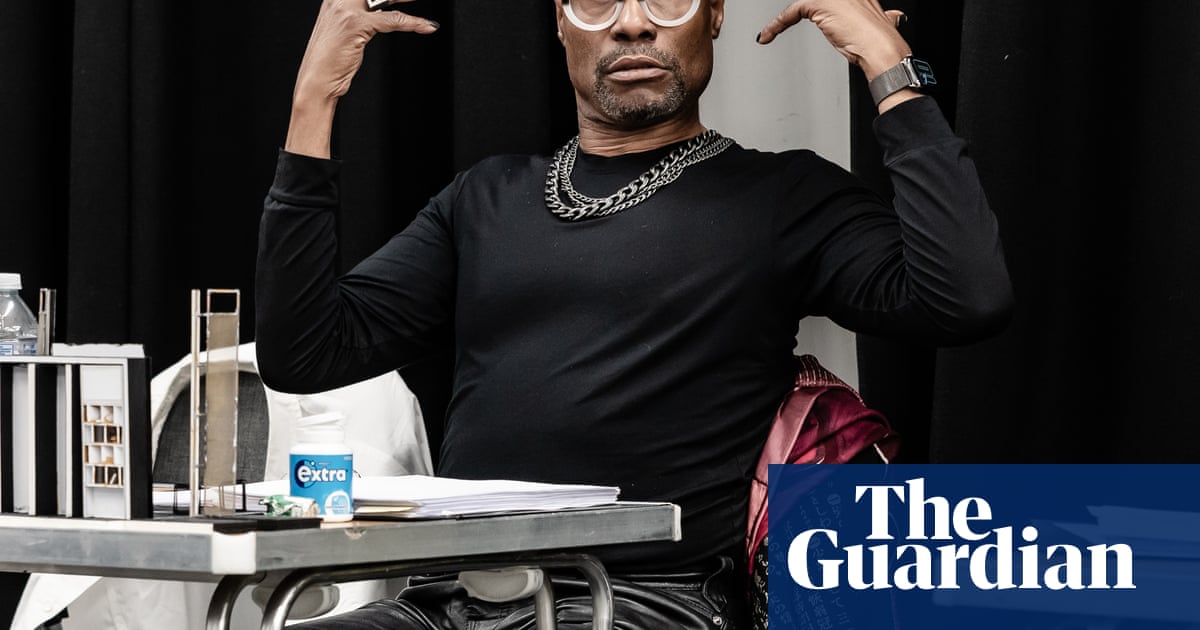When Billy Porter talks, people listen. They have no choice. The actor, fresh from a stint as Emcee in the London run of Cabaret, and about to reprise the roleon Broadway, speaks in a poised, purposeful, regal fashion. Each word is selected with care and weighed in his hand as if it were an avocado in the fruit and veg aisle, the gaps between words so lengthy that it isn’t always clear when he has finished speaking. Seated around the table in the south London studio where Porter is overseeing rehearsals for This Bitter Earth, which marks his UK directorial debut, are the playwright Harrison David Rivers and the actors Omari Douglas (It’s a Sin) and Alexander Lincoln (Emmerdale). Everyone maintains an attentive silence while Porter is speaking, until there can be no doubt that he has completed his thought.
The Guardian’s journalism is independent. We will earn a commission if you buy something through an affiliate link.Learn more.
“The …beautiful… part of this play,” he says, easing his feet out of a pair of marshmallow-soft cream-and-ebony moon boots and nudging them to one side, “is we get to watch two people who love each other try … time … and time … and time … andtimeagain … and they never give up … onthemselves… or on love. There is hope … We don’t have to be divided. Having conversations that are complicated is what makes the healing happen … without blame … without shame.”
This Bitter Earth is a fragmentary, non-linear portrait of the passionate but strained relationship between two queer men in their late 20s and early 30s. The action ricochets back and forth across the years between 2012, when Barack Obama was still in the White House, and 2015, when Donald Trump (who goes entirely unmentioned) announced his own presidential campaign.
Neil, played by Lincoln, is a white Black Lives Matter activist described in the dramatis personae as “an enthusiast [who] means well”, while Jesse (Douglas) is a Black playwright upbraided by Neil for his apparent lack of political engagement. Protest, though, can take many forms. As Jesse argues: “I’m living my fucking life! What else do you want from me?”
Once the actors have read through a scene in which Neil expresses disappointment because Jesse gave only a passing greeting to his white activist friends, Porter turns to his actors: “Great. So what is this about? What bug is up your ass and what are you trying to incite?” While they debate the characters’ intentions, Rivers looks on. His play premiered in 2017, and he isn’t usually involved in new productions of it. “It’s fun for me to re-meet the play after eight years of living and the world shifting,” he says.
Or not shifting. “I wish it felt different now. You write a play and you hope that you’ve solved all the problems. The dream is that people will pull out what you wrote and be, like, ‘Remember when we didn’t respect people and there was violence and we didn’t know how to talk with one another?’ The play is important now because we can step out of this room and into a very similar world. That’s sad. But let’s speak to it anew and try again to make a change.”
“We have to keep trying!” booms Porter in his distinctively husky battle-cry.
Back to the scene. Lincoln, wearing a grey singlet that shows off his tats, clearly comprehends what his character cannot: “Neil doesn’t see that simply stepping out of your house in the morning can be your protest.”
It is an argument with which Porter can readily empathise. “Living is a protest,” he says. “Or walking down the street … wearing … ahat. When David Bowie does it, he’s a genius. When Kiss do it, they’re rock stars. Because they’rewhite.” He peers over the top of his glasses with a disdainful look. “But it’s just a hat. It’s … just … ahat. Now shut the fuck up!” In the space of one monologue, Porter has apparently slipped between the roles of director, memoirist and actor, his final admonition addressed to the fictional Neil rather than to anyone in the room. As a directing style, you might call it cubist.
Rivers commends Porter for being “present” and for living “now, now, now”. He explains: “I think Billy’s urgency is being directed into the play.”
When I ask whether the two actors recognise the sort of “whitesplaining” comments that Neil makes to Jesse, Douglas rolls his eyes: “Oh God, yes. If I told you about them, we’d be here all day.” I confess that I was wincing too, hearing echoes of myself in Neil’s patronising liberalism. “Why ‘wince’?” Porter demands across the table. “I would encourage you – andI’mnot interviewingyouhere – to take the ‘wince’ out of it. The openness to having the conversation is the point. ‘When you know better, do better,’ is what Maya Angelou always said. Now, when you know better and youdon’tdo better –that’swhen I’m comin’ at you!”
This Bitter Earth is atSoho theatre, London, until 26 July
